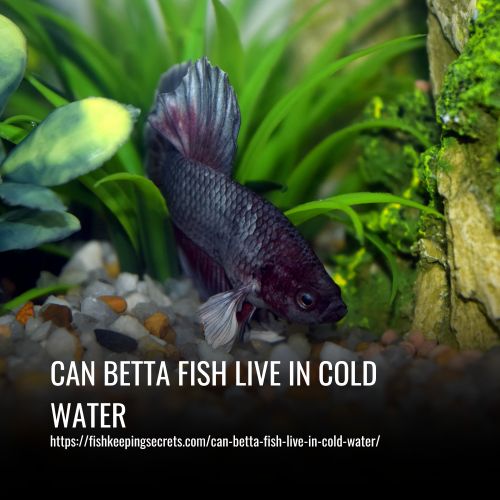Can Betta Fish Live In Cold Water
This post contains affiliate links. As an Amazon Associate, we earn from qualifying purchases.
No, betta fish are tropical fish and require warm water temperatures between 75-80 degrees Fahrenheit to thrive and stay healthy. Cold water can be detrimental to their health and may lead to stress, sickness, and even death.

Can Betta Fish Live in Cold Water?
One of the most important aspects to consider is water temperature. As these tropical fish originate from Southeast Asia, they can become stressed and potentially ill if kept in cold water environments. Therefore, it is important to maintain the right temperature for your betta fish’s tank as this will ensure their health and well-being.
The ideal temperature range for a betta fish’s tank is between 76°F and 82°F (24°C – 28°C). If the water in your tank drops too low, there are several signs that your betta may be feeling cold, such as decreased appetite, dull colors, and sluggish or lethargic behavior.
It is also important to note that colder temperatures increase the risk of diseases such as bacterial infections, so it’s best to avoid any significant fluctuations in temperature. To maintain a consistent temperature in your tank, you can purchase an aquarium heater or use an under-gravel heating system. You should also check the thermometer regularly to make sure that it has not moved out of range or malfunctioned.
Key Takeaways
It is important to maintain the optimal temperature for your betta in order to keep it healthy. The ideal temperature is 78°F to 80°F (25-27°C). When the temperature drops below 16°C, your fish is at a higher risk of dying and may experience symptoms such as lack of appetite, inactivity, weak immune system, clamped fins, labored breathing, and color loss.
In order to ensure that the temperature remains stable and safe for your betta fish, you will need to purchase a thermometer or heater and add some live plants and decor to the tank. Additionally, you may want to invest in artificial light if your tank is located in an area with low natural light. Monitoring your betta’s water temperature regularly can help ensure that its body is kept at an ideal temperature and help prevent any health issues.
How Long Can Betta Fish Survive in Cold Water?
The answer to how long a betta fish can survive in room-temperature water depends on the temperature of the water. Generally speaking, they can survive anywhere from 3-6 months in such temperatures.
However, this is much shorter than the usual lifespan of bettas in captivity which is 3-5 years. Low temperatures make them more vulnerable to disease and slow down their metabolism significantly.
Therefore, it is important to ensure that they are provided with appropriate temperatures and healthy living conditions to maximize their lifespan.
What’s the Ideal Water Temperature Range for Betta Fish?
It is important to maintain the correct temperature for your betta fish in order to ensure their survival and optimal health. Although they can survive temperatures ranging from 65-90 degrees Fahrenheit, a narrower range of 78-82 degrees Fahrenheit is ideal for their immune system and metabolism to function properly.
As fish rely on external conditions for warmth, low temperatures are necessary to keep them healthy. Therefore, it is important to monitor your fish’s environment and make any necessary changes such as adjusting the thermostat.
Additionally, make sure that you provide a balanced diet and maintain good water quality which can also help keep your betta vibrant and healthy.
Your betta fish will be less active
According to a study by Hans-Werner Lissmann in 1932, Betta splendens, also known as Siamese Fighting Fish, will have a higher attack-response frequency at a tank temperature of 28 degrees Celsius than at 22 degrees Celsius despite being presented with the same stimulus.
Research conducted by him showed that keeping fish in cooler temperatures helps them to save energy, which was documented in his paper entitled “The Environment of the Fighting Fish (Betta splendens Regan)”.
Bettas are territorial and display aggressive behavior when faced with other bettas; Lissmann demonstrated this by showing an image of another betta fish to elicit a response from his subjects.
Your Pet Fish Will Lose Its Appetite
Cold temperatures can have serious impacts on the health of a betta fish. These effects can range from digestive issues such as bloating and constipation to long-term problems such as dropsy. Dropsy is the accumulation of fluid in a fish’s internal organs and is often associated with organ failure.
If left untreated, it can eventually lead to death. It is important to ensure that your betta tank is kept at an optimal temperature in order to avoid any potential health complications.
Its Immune System Will Weaken
It is vital to ensure that your betta fish’s tank water remains adequately warm, as colder water temperatures can cause significant damage to the fish’s health. When exposed to cold water, a betta’s stress levels increase, and its immune system is weakened. This compromised immunity leaves the betta at greater risk of developing parasitic illnesses such as fin rot and ich.
Poor water quality, system instability, or injury can further deteriorate their overall health if not treated promptly. Unless action is taken to bring their environment back to a safe temperature range, exposing bettas to cold water in the long term will eventually kill them.
What are the other severe signs that my betta fish is cold?
Act fast or your Siamese fighting fish might not make it – watch out for telltale signs of trouble like sinking, sickness, and early departure!
1. Labored breathing:
Rapid gill movements, swimming toward the surface of the tank, and labored breathing are all signs that your fish is having difficulty getting enough oxygen. This could be due to poor water quality, a lack of oxygen in the water, or other factors. It’s important to test the water regularly and ensure that it is properly filtered and aerated.
Additionally, if your tank has live plants, they can help oxygenate the water naturally. If you notice any of these signs of distress, you should take immediate steps to improve the water quality of your fish.
2. Clamped fins:
Clamping fins is a way for your pet fish to conserve energy and warmth. When fins are clamped, they appear shorter as the fin rays become constricted and pulled close to the body. It’s important to check your water quality regularly and make sure the temperature is at an appropriate level.
If you notice that your fish are often clamping their fins, it could be an indication of stress or illness and you should consult an expert immediately.
3. Losing color:
Signs of cold stress in Siamese fighting fish can include dulling colors, fading colors, and eventually turning white. These signs suggest that the water temperature is too low for the fish’s needs.
If you notice your betta showing any of these signs, it’s important to check the water temperature and quality immediately to ensure they are within a healthy range and make any necessary adjustments. Providing them with warmer water and a well-filtered aquarium can help keep the fish healthy and vibrant.
How To Prevent Betta Fish Temperature Shock?
Temperature shock, also known as thermal shock, is a common problem in betta fish. It can occur when a fish is exposed to sudden changes in temperature, such as cold or hot water. Symptoms of temperature shock include labored breathing, clamped fins, and dulling colors.
To prevent temperature shock in your betta fish, it is important to monitor the temperature of the aquarium regularly and make adjustments if needed. Here are some best practices to follow:
1. Have a thermometer for your betta tank:
Maintaining a suitable environment for pet fish is important in order to keep them healthy and avoid water temperature shock. An aquarium thermometer and fish tank heater can help you monitor the temperature of the tank and ensure it remains stable.
For greater accuracy, choose a thermometer that can be placed inside the tank instead of one that sticks to the outside glass – air temperatures surrounding the tank may affect reading accuracy. With these tools, you will be better equipped to create an ideal living space for your fish and ensure their optimal health and well-being.
2. Invest in a good aquarium heater:
When it comes to keeping your fish tank warm, an adjustable aquarium heater is essential. When the temperature drops below 25°C, this should be taken into consideration, particularly if you are located in an area with a cold climate.
A heater will help maintain a constant water temperature between 26–28°C, and most have a built-in thermostat for safety and ease of use. However, it’s still important to periodically check the water temperature to make sure it stays within the ideal range.
3. Change your betta tank water to the appropriate temperature:
It is important to keep the water temperature of your betta fish at the optimal level for its health and well-being. To ensure that your fish do not suffer temperature shock, it is important to use a thermometer and practice acclimation when changing the water.
Acclimation involves gradually increasing the temperature of new water to match that of your betta fish tank by steadily adding small amounts of tank water to a separate container containing your betta. This allows them to slowly adjust to the new temperature and prevents sudden changes in their environment.
4. Set up a good lighting system for your betta:
Ensuring a consistent water temperature in the betta fish tank is important for the fish’s health. To do this, a good lighting system is essential. Artificial lights such as LED or fluorescent lights are the best option, as they provide controllable heat and are energy-efficient.
However, care must be taken to ensure that your betta does not receive too much light, so investing in a light timer is recommended. This will allow you to control how long the lights remain on and ensure that there are sometimes darker periods for your fish to rest and sleep.
5. Use a Small Fish Tank:
When keeping a betta, it is important to choose the right size tank. A small aquarium of at least three gallons is ideal, as it will warm up more quickly than a larger tank. However, you should avoid using containers that are too small, as this could be dangerous for your fish.
Additionally, make sure that the tank has plenty of room for swimming and hiding places for your betta to feel secure. Proper filtration and aeration are also essential for maintaining good water quality and keeping your fish healthy.
6. Add live plants and some decor:
Having live plants and decorations in your betta fish tank can help create a more stable environment for your fish. Live plants provide oxygen to the tank, while decorations such as driftwood and rocks give your betta fish places to hide and feel safer.
Additionally, adding these items to your tank can help keep the temperature consistent, which is important for maintaining a healthy environment for your pet.
7. Simply Cover the Betta Tank:
The use of a firm lid on a betta tank is an effective way to retain the warmth inside, particularly in areas that experience significant temperature drops during the night.
Experienced betta owners have employed this tactic for some time, and they have determined it to be helpful. Make sure the lid is fitted properly to ensure no air exchange takes place and the betta fish is provided with the necessary warmth.
Will Cold Water Kill Betta Fish?
Cold water can be deadly for Betta fish, as their natural habitat is tropical. Having the temperature of the water outside of ideal levels can damage their metabolism over time and make them less resistant to infections.
Signs that your Betta is in cold water include lethargy, sluggishness, and difficulty digesting food. It’s important to keep the temperature of the water within ideal parameters to ensure your fish’s health and well-being.
Can Betta Fish Get Sick from Cold Water?
Betta fish are susceptible to cold water, which can weaken their immune systems and render them vulnerable to infections. Additionally, cold water may make Betta fish less active and restrict their ability to access enough oxygen from the water.
Furthermore, cold water may also disrupt their natural activity levels such as eating habits and swimming behaviors. Lastly, an extreme result of cold water on your Betta fish is known as popeye disease—swollen or abnormally protruding eyes on your fish that indicate a serious infection.
Therefore, it’s important for aquarium enthusiasts to make sure their tank is set to the ideal temperature for Betta fish in order to prevent illnesses in their pets.
FAQs
No, Betta fish cannot survive in cold water. They require a heated environment of at least 74-78 degrees Fahrenheit. Although they may survive briefly in colder water, it will weaken their immune system, making them more vulnerable to disease and causing stress that can lead to death.
No, bettas are tropical fish and need a regulated water temperature to thrive. A heater should be used to maintain the ideal water temperature of 75-80°F (24-26°C). Without a heater, your betta may become stressed and vulnerable to various illnesses.
If the temperature of a betta fish is low, some common signs may include reduced appetite, lethargy, and decreased activity, rapid breathing, and a change in color.
An aquarium heater with a thermostat is recommended for optimal temperature maintenance of betta fish habitats.
This will maintain the water temperature within the accepted range and guarantee your betta’s overall health and well-being. Additionally, you should obtain other necessary supplies for your betta.
Correct! Humans and many other animals are considered warm-blooded, meaning they can naturally adjust their body temperature to be slightly different than the external temperatures in their environment.
Cold-water fish, tropical fish, and bettas, however, cannot adjust their body temperature and must move to a location where the temperature matches their comfort level.
Ich and Velvet are two common disease outbreaks when the water temperature fluctuates. Fin/tail rot and cottonmouth fungus may be present when the temperature rises, although this is not always the case.
If you have ever asked yourself, “Can tropical fish survive cold temperatures?” the answer is yes, in most cases. Although tropical fish prefer warm water, they can adapt to cold temperatures for short periods of time. When these fish are shipped to stores, they are usually sent at lower temperatures in order to keep their metabolism slowed down.
They can then be revived by keeping them in their ideal temperature range for a few hours and increasing the airflow in their tanks. It is important to monitor your fish during this process and make sure the temperature rises gradually so that they don’t experience too much stress.
Conclusion:
Though they technically can live in cold water, it is not suggested because of their inability to regulate their temperature. If you have a betta fish, make sure that the temperature remains between 74°F and 80°F.
This will ensure that he thrives and maintains good health. Betta fish are a great addition to any home aquarium, but it’s important to remember that extreme temperatures should be avoided for his safety.






